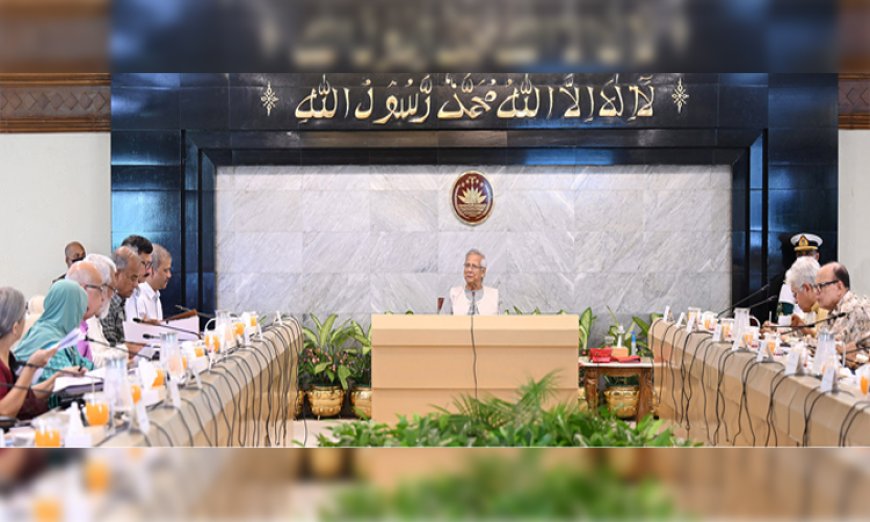Telecom Transformation: Interim Government Approves Draft Licensing Policy 2025

আশিকুর রহমান চৌধুরী ১৭ নভেম্বর, ২০২৫
সিনিয়র স্টাফ করেসপন্ডেন্ট ২ সেপ্টেম্বর, ২০২৫

The Advisory Council of the interim government has approved the draft of three policies, including the Telecommunication Network and Licensing Policy 2025 of the Posts and Telecommunications Division.
The approval came during the Council’s 41st meeting, held on Thursday, September 4, at the Chief Adviser’s Office, chaired by Chief Adviser Professor Dr. Muhammad Yunus. Among others, Faiz Ahmad Taiyeb, Special Assistant in charge of the Posts, Telecommunications, and Information Technology Division, was present.
The new policy will be legally grounded in the Bangladesh Telecommunication Regulatory Act 2001. It aims to transform the telecommunications sector into a technology-neutral, simplified, and competitive structure. According to Faiz Ahmad Taiyeb, this will enable service providers to deliver services more smoothly, adopt new technologies with ease, and enhance efficiency and quality across the sector.
He observed that the policy would be business-friendly, allowing flexibility to innovate with suitable technologies such as fiber, wireless, satellite, or cloud/edge computing.
The policy draft proposes the implementation of an IP-based traffic framework for interconnection and peering. The government expects this to reduce operating costs and improve service quality.
According to the outline, the new framework replaces the International Long-Distance Telecommunications Services (ILDTS) Policy 2010. International connectivity will now be managed by International Connectivity Service Providers, who will handle everything from voice, data, and internet to IP transit and international peering services. However, all international connectivity must be routed domestically to prevent illegal routes and revenue leakage.
For domestic connectivity and peering, new mandatory arrangements will be introduced. Access Network Service Providers (ANSPs) will be required to ensure local interconnection of voice and data, either through forming a consortium or by availing support from a qualified entity. Meanwhile, the existing National Internet Exchange (NIX) license will be abolished, though a similar peering system will remain in practice.
The policy pledges to safeguard government revenue, maintain the tax-to-GDP ratio, ensure participation of local small entrepreneurs, and above all, extend affordable digital services to youth and rural populations.
The draft was signed by Posts and Telecommunications Division Secretary Abdun Naser Khan and Chief Adviser’s Special Assistant Faiz Ahmad Taiyeb.
Through the Bangladesh Telecommunication Regulatory Commission (BTRC), the policy seeks to restructure the country’s networks into simpler, more efficient, and adaptive systems, and to rationalize the licensing regime to foster healthy competition and sustainability.
Preliminary discussions highlighted that while telecommunications remains a cornerstone of Bangladesh’s digital progress, the sector still suffers from complexities, network congestion, and infrastructure weaknesses. Underutilization of fiber networks and submarine cables, limited data center capacity, and poor service quality are undermining its potential. These challenges have led to local traffic being routed abroad, thereby weakening national digital sovereignty.
The preamble of the policy underscores that as global technologies blur the lines between voice and data services, Bangladesh’s fragmented, tier-based licensing framework has hindered market dynamics. The multiplicity of licenses has discouraged investment and innovation while inflating operational costs and complexities. The new policy has been designed to overcome these obstacles.
According to the Chief Adviser’s Press Wing and Information Release, the meeting also approved the draft of the Renewable Energy-Based Commercial Power Generation/Power Plant Establishment Policy 2025 under the Power Division, the Telecommunication Network and Licensing Policy 2025 under the Posts and Telecommunications Division, and the International Crimes (Tribunals) (Third Amendment) Ordinance 2025 under the Law and Justice Division.
The drafts will receive final approval following vetting by the Legislative and Parliamentary Affairs Division.
ফাহিম মাশরুর ১৮ নভেম্বর, ২০২৫
আশফাক সফল ১৭ নভেম্বর, ২০২৫
ফিরোজ আল শামস ৬ নভেম্বর, ২০২৫
স্পেশাল করেসপন্ডেন্ট ২৭ অক্টোবর, ২০২৫
স্পেশাল করেসপন্ডেন্ট ২৩ অক্টোবর, ২০২৫
আন্তর্জাতিক ডেস্ক ১৯ নভেম্বর, ২০২৫
আন্তর্জাতিক ডেস্ক ১৯ নভেম্বর, ২০২৫
আন্তর্জাতিক ডেস্ক ১৯ নভেম্বর, ২০২৫
আন্তর্জাতিক ডেস্ক ১৯ নভেম্বর, ২০২৫
Total Vote: 59
যৌক্তিক




